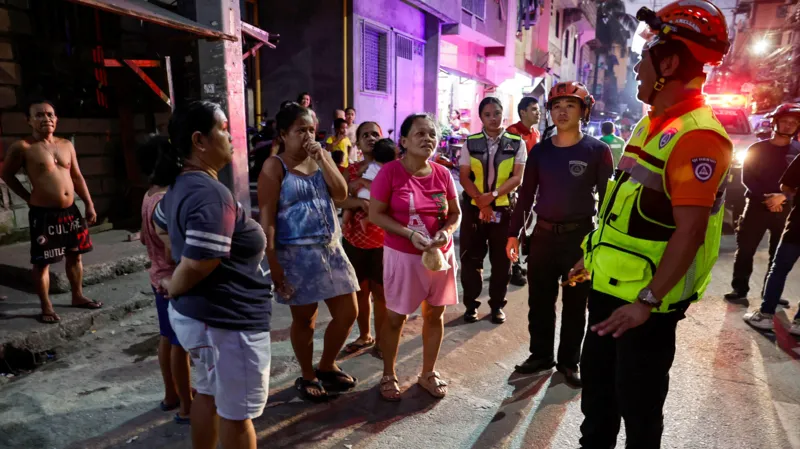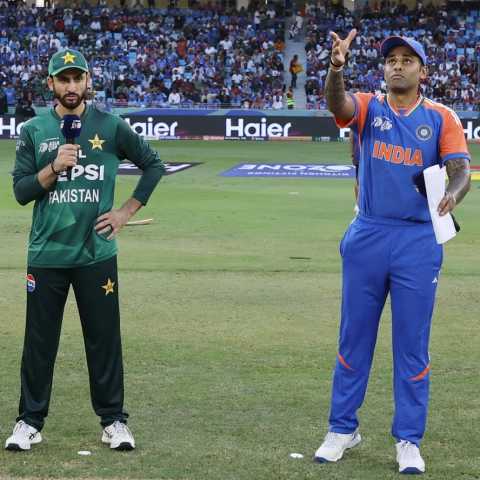Latest News
Sixth typhoon in a month makes landfall in Philippines

A potentially catastrophic super typhoon has made landfall in the Philippines – the sixth typhoon to hit the country in a month.
Man-Yi, known locally as Pepito, touched down at 21:40 local time (13:40 GMT) with maximum sustained wind speeds of 195 km/h (121mph) along the coast of the eastern Catanduanes island, the state forecaster said.
It has warned of a “life-threatening storm surge”, heavy rains and severe winds, and hundreds of thousands of people had been evacuated ahead of the storm’s arrival.
At least 160 people are known to have died in the five previous earlier storms.
Super Typhoon Man-Yi is expected to impact a large area, BBC Weather reports. There will be widespread heavy rain in northern areas, with more than 300mm (11 inches) expected to fall on Saturday and Sunday – leading to potential flooding and increasing the risk of mudslides.
Winds of up to 270km/h are also expected, as are waves of up to 15m (49ft) in eastern coastal areas.
The capital, Manila, may be spared the worst of the winds as the storm tracks to its north, before crossing the island of Luzon – the largest and most populous island in the Philippines – and heading offshore by Monday.
Dozens of flights have been cancelled due to the incoming storm, according to local broadcaster ABS-CBN News.
More than 400,000 people heeded evacuation orders ahead of the storm, civil defence said. Its head, Ariel Nepomuceno, has urged everyone living in the storm’s projected path to comply these orders.
“It is more dangerous now for those in landslide-prone areas because the ground has been saturated by the consecutive typhoons,” Mr Nepomuceno said.
Glenda Llamas is among those who have had to leave their homes.
“We are terrified of the typhoon, as it may intensify and the waters can rise,” she told the AFP news agency from a shelter in the eastern Albay province.
“If we didn’t evacuate we wouldn’t be able to get out later, we don’t have anyone else in the house but us.”
“We already have a lot of phobia due to the previous calamities that happened here like floods, strong winds and other disasters,” said Melchor Bilay, who was evacuated to a school further south, in Sorsogon province.
While typhoons are not uncommon in the Philippines, forecasters say it is unusual to see so many tropical storms in the Pacific at the same time during the month of November.
Tropical Storm Trami dumped one month’s worth of rain over large swathes of the northern Philippines in late October, leaving dozens of people dead.
This was followed by Typhoon Kong-rey, in which at least three people were killed. It was also the biggest typhoon to directly hit Taiwan in nearly 30 years.
Typhoon Yinxing affected the north of the island of Luzon earlier this month, where it brought nearly 250mm (10in) of rain in some areas.
There has since been Typhoon Toraji and, earlier this week, Typhoon Usagi, which brought a three-metre storm surge and torrential rainfall exceeding 200mm (8 inches).
The United Nations’ climate change body, the IPCC, has said that while the number of tropical cyclones that happen globally is unlikely to increase due to a warning planet, it is “very likely” they will have higher rates of rainfall and reach higher top wind speeds.
This means a higher proportion would reach the most intense categories.
[BBC]
Latest News
‘Our flight is booked, we’re going’: Suryakumar on India vs Pakistan

Will India and Pakistan face each other on February 15 in Colombo?
Even as that question hangs heavy like the thick and suffocating Mumbai smog over the T20 World Cup 2026, Indian captain Suryakumar Yadav said his team will travel to Colombo whether the match happens or not.
“Our Mindset is pretty clear,” Suryakumar said at the captains’ media briefing on Thursday in Mumbai. “We did not refuse to play them. The refusal came from them (Pakistan). ICC organised the fixture. BCCI and the Indian government decided to play in neutral venue in coordination with ICC. Our flight to Colombo is booked. So we are going. We’ll see what happens later.”
Defending champions India begin their World Cup campaign on the opening day – February 7 – against USA in Mumbai. India start as firm favourites based on their phenomenal domination in the format in this World Cup cycle. Suryakumar’s team provided further evidence of that on Monday evening in Navi Mumbai where they nudged aside South Africa in the warm-up match. Such form has allowed Suryakumar to be more relaxed and light-hearted during media briefings and same was the case on Thursday.
Asked what the mood in the Indian dressing room was around the Pakistan match, Suryakumar said: “The discussion in the team is ekdum (absolutely) clear. First we play the match on February 7, then we will head to Delhi (Namibia on February 12) and then we will travel to Colombo.”
Suryakumar’s is the first formal response from the India side on the topic, and comes a day after Pakistan Prime Minister Shehbaz Sharif said his government had taken a “cons8dered stance” on boycotting the India match and did not want “politics in sport”.
This is the second time in six months Suryakumar has found himself facing questions on how India-Pakistan matches were getting impacted due to the fraught political relations between the two nations, after the Asia Cup controversy last year. The BCCI had instructed the Indian team then to not shake hands with the Pakistan team, at the behest of the Indian government. India then refused to receive the Asia Cup trophy after winning the tournament from ACC president and PCB chairman Mohsin Naqvi, who also declined to hand over the trophy.
Suryakumar said he could not do much about the current situation apart from turning up with his team in Colombo.
“Pakistan’s decision is not in my control,” he said. “I wish I could take that decision. But then it’s their (Pakistan) call. We’ve been told that we have to play on the 15th. We played the Asia Cup, we played three times. We played some good cricket against them. We won. We were happy. And, similarly, if we get an opportunity again in Colombo we will definitely play our game.
“I feel it is not an easy job. I’m sure they must be working out something. But if the boycott has come from the other government or the nation, how can… It is a difficult call for them as well. I know it’ll be a difficult situation. But, as I said, if we are told and the fixtures are ready we will definitely go ahead and play.”
(Cricinfo)
Latest News
Captain’s knock helps Petes

Latest News
Delhi Capital’s fourth shot at elusive trophy as Royal Challengers Bengaluru look to make winning a habit

The grand finale of WPL 2026 carries a distinct India-South Africa flavour, much like the World Cup final two months ago. But the epicenter is Vadodara and not Navi Mumbai, the traditional home of Indian women’s cricket. However, that won’t make the occasion any less special.
The marquee names line up symmetrically. Shafali Verma and Jemimah Rodrigues on one side; Smriti Mandhana and Richa Ghosh on the other. Marizanne Kapp and Laura Wolvaardt on one side, Nadine de Klerk on the other.
Threading between these big stars are two high-impact overseas allrounders from West Indies and Australia, each having contributed to their team’s journey to the final in their own way.
Chinelle Henry has been an unheralded star for Delhi Capitals (DC). Her three-for in the Eliminator may have gone unnoticed in the larger scheme of things, but it was as important as Shafali and Lizelle Lee’s opening stand or Rodrigues’ cameo. For Royal Challengers Bengaluru (RCB), Grace Harris has filled an even larger void. In Ellyse Perry’s absence, she has become the powerplay enforcer, dominating attacks and setting up games for the likes of Ghosh and de Klerk to finish.
The prospect of these two sides pitted against each other in the final seemed an unlikely prospect even during the auction. Mumbai Indians appeared the obvious front runners, having retained the core that delivered two titles in three seasons.
RCB, meanwhile, were without Perry, and when they opted to replace her with an uncapped Indian fast bowler in Sayali Satghare, fully aware that Pooja Vastrakar would be unavailable for much of the season, the knives were out. Satghare has since become a key strand in RCB’s seam attack.
Thursday’s final also brings a contrast to their journeys to the final. RCB took the route DC did for three seasons running – winning six out of their eight games to top the group. DC have scraped through a sequence of must-win games and will now play their third knockout in five days.
DC are chasing that elusive fourth attempt at glory to help bring silverware to a franchise that is yet to win a major; RCB is looking at making winning titles a habit, attempting a hat-trick of wins (IPL included).
In each of the three previous finals, the winner of the Eliminator has gone on to win the title. Will Thursday be any different?
RCB are likely to back Vastrakar to play as a specialist batter. While she has begun bowling in the nets, a call has been taken to ease her in, given she has returned to competitive cricket after 15 months. Arundhati Reddy’s lack of form is the only other area of concern that could potentially bring in legspinner Prema Rawat into the equation.
RCB (probable): Smriti Mandhana (capt), Grace Harris, Georgia Voll, Richa Ghosh (wk), Radha Yadav, Nadine de Klerk, Pooja Vastrakar, Shreyanka Patil, Sayali Satghare, Arundhati Reddy/Prema Rawat, Lauren Bell
DC are likely to be unchanged. In fact the 13 players they’ve used this season are the fewest resources a team has used across four WPL seasons.
DC (probable): Shafali Verma, Lizelle Lee (wk), Laura Wolvaardt, Jemimah Rodrigues (capt), Marizanne Kapp, Chinelle Henry, Niki Prasad, Sneh Rana, Minnu Mani, Nandani Sharma, N Shree Charani
[Cricinfo]
-

 Opinion7 days ago
Opinion7 days agoSri Lanka, the Stars,and statesmen
-

 Business6 days ago
Business6 days agoHayleys Mobility ushering in a new era of premium sustainable mobility
-

 Business3 days ago
Business3 days agoSLIM-Kantar People’s Awards 2026 to recognise Sri Lanka’s most trusted brands and personalities
-

 Business6 days ago
Business6 days agoAdvice Lab unveils new 13,000+ sqft office, marking major expansion in financial services BPO to Australia
-

 Business6 days ago
Business6 days agoArpico NextGen Mattress gains recognition for innovation
-

 Business5 days ago
Business5 days agoAltair issues over 100+ title deeds post ownership change
-

 Editorial6 days ago
Editorial6 days agoGovt. provoking TUs
-

 Business5 days ago
Business5 days agoSri Lanka opens first country pavilion at London exhibition













